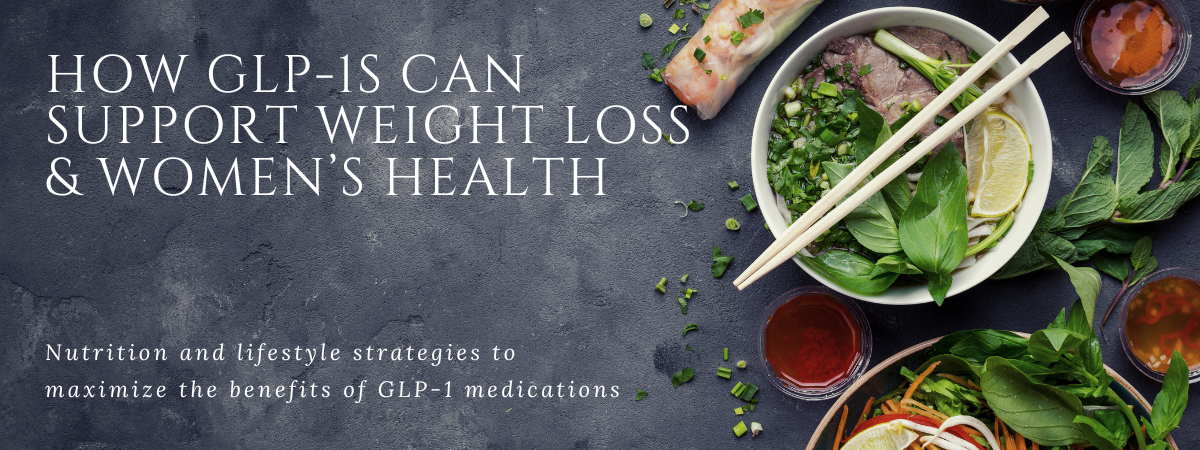
Gunja Parikh, MS, RDN, LDN
As a registered dietitian, I’ve seen firsthand how GLP-1 receptor agonists (GLP-1s) like Semaglutide and Tirzepatide can support weight loss and improve metabolic health for women. While these medications offer significant benefits, nutrition remains a cornerstone for sustainable results. Understanding how GLP-1s work and implementing effective dietary strategies empowers women to achieve lasting wellness.
Understanding GLP-1 Medications and How They Work
GLP-1 receptor agonists mimic a natural hormone that regulates appetite, slows gastric emptying, and helps maintain stable blood sugar levels. They are effective tools for weight management and type 2 diabetes support but are not a substitute for proper nutrition. Combining GLP-1 medications with a balanced diet maximizes results and ensures women meet their body’s nutrient needs.
Key Nutrition Strategies for Women on GLP-1s

Prioritize Protein for Muscle Maintenance
GLP-1s can reduce appetite, increasing the risk of unintentional muscle loss, especially for post-menopausal women. Aim for 20-30 grams of protein per meal from sources like lean meats, fish, eggs, dairy, tofu, or legumes. Protein-rich snacks such as Greek yogurt, cottage cheese, or nuts help maintain muscle. Collagen peptides or protein powders can also support adequate intake.
Boost Fiber Intake for Digestive Health
Since GLP-1s slow digestion, fiber intake is crucial to prevent constipation. Aim for 25-30 grams daily from vegetables, fruits, whole grains, and legumes. Gradually increase fiber and stay hydrated. Include flaxseeds, chia seeds, and psyllium husk, along with fermented foods like yogurt, kimchi, and sauerkraut for added gut support.

Stay Hydrated Throughout the Day
Reduced appetite can lower fluid intake. Aim for 8-10 cups of water daily, and include water-rich foods such as cucumbers and oranges. Herbal teas or electrolyte drinks can help, particularly if gastrointestinal side effects occur. Setting reminders ensures hydration is consistent.
Maintain Nutrient Balance
Smaller meals may lead to nutrient deficiencies. Prioritize leafy greens, berries, nuts, seeds, and fortified whole grains. Calcium and vitamin D support bone health, while iron-rich foods like lentils, spinach, and lean meats are important for pre-menopausal women. Supplements may be considered under professional guidance.
Common Challenges When Taking GLP-1 Medications
Managing Nausea and Gastrointestinal Discomfort
Nausea is a frequent side effect, especially when starting GLP-1 therapy. Eat small, frequent meals with bland, easy-to-digest foods like oatmeal, applesauce, or boiled potatoes. Avoid fried, greasy, or spicy foods. Ginger tea or chews can help, and eating slowly reduces discomfort.
Navigating Reduced Appetite
Even with a diminished appetite, aim for balanced meals with lean protein, healthy fats, and complex carbohydrates. Liquid nutrition, like smoothies or meal replacement shakes, can help meet calorie and nutrient needs. Track food intake and consider dietitian guidance for personalized meal planning.
Supporting Emotional Well-Being During Weight Loss
Weight loss journeys can be emotionally challenging. Women may feel frustrated or guilty about food choices. Mindful eating, celebrating non-scale victories, journaling, and seeking support through therapy or groups enhances overall well-being. Focusing on physical and mental health together strengthens sustainable results.

Creating a Sustainable Lifestyle
Remember, GLP-1s are a tool, not a quick fix. Consistency in nutrition, physical activity, and self-care is key for long-term women’s health. Consider incorporating activities like strength training to preserve muscle mass and cardiovascular exercise to support heart health. Prioritize stress management, adequate sleep, and routine medical check-ups. Strength training twice per week, paired with daily movement like walking or yoga, can greatly enhance metabolic health. Find activities you enjoy to create a sustainable routine. Experiment with different forms of movement like swimming, cycling, or group fitness classes for added variety.
For women, GLP-1 medications can be a powerful part of a weight loss and wellness plan. Combining them with evidence-based nutrition, mindful habits, and emotional support promotes lasting health and empowers women to achieve sustainable results.

Gunja Parikh
MS, RD, LDN
Gunja is a Licensed and Registered Dietitian with a passion for helping individuals improve their eating habits to reach their nutrition goals... READ MORE
